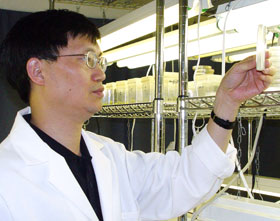  |
| HOME | THIS ISSUE | CALENDAR | PATENTS | BACK ISSUES | < BACK | NEXT > |
Plant scientist develops new tool to protect crops from modified genes
by Beth Krane - February 26, 2007
|
||||
| UConn plant biologists have developed a tool that may help alleviate public concerns surrounding genetically-modified plants. Controlling the flow of transgenic genes into the wild via pollen and seeds has been a huge concern to the public and a major challenge for scientists specializing in agricultural biotechnology.
The tool, called a “GM-(genetically-modified)-gene-deletor,” could prevent genetically-modified gene flow into non-biotech crops or weeds. The invention may be particularly useful to confine genetically altered genes used in vegetatively-propagated, undomesticated bio-energy crops, such as poplar, willow, and switchgrass. The technology, developed in the laboratory of Yi Li, associate professor of plant science, provides a successful method for eliminating all the transgenic genes from pollen and seeds if needed. The research is published in the March issue of Plant Biotechnology Journal. UConn’s GM-gene-deletor technology also could allow farmers to produce non-genetically modified consumer products, such as seeds, fruits, and flowers, from transgenic plants. “For example,” Li explains, “herbicide-resistant genetically-modified traits are primarily needed to protect crops during growth prior to seed or fruit development. The GM-gene-deletor could initiate the gene deletion process immediately prior to seed or fruit development. That way, farmers would get the benefit of the added crop protection during a critical growth stage, without the unintended consequence of an uncontrolled spread of a herbicide-resistant gene, which some believe could create ‘super weeds.’” UConn’s GM-gene-deletor also could be used in crops that are genetically modified for the production of pharmaceuticals to block the accidental transmission of these traits into food crops through seed or pollen. The new technology also holds the potential to end a long-standing debate on so-called “terminator” gene or “terminator” seed technology that has pitted major agricultural biotechnology companies against poor farmers in developing countries. The terminator technology inserts terminator or suicidal genes into genetically-modified seeds to ensure that no genes from genetically-modified crops contaminate non-genetically-modified crops. This process protects the companies’ patents and could alleviate some of the same consumer concerns Li’s technology addresses, but at the expense of poor farmers in developing countries, who would have to buy fresh seeds every year because the terminator gene system renders the genetically modified plants sterile. The terminator technology has yet to be commercialized because of the problems it poses for farmers in developing countries. “With our technology,” says Hui Duan, one of Li’s former doctoral students and a co-author of the published research, “the seeds the farmers save will not have genetically-modified traits. The farmers would need to buy new seeds each year if they want the crops to have genetically-modified traits such as insect resistance or herbicide resistance. But if they did not want to do so or could not afford to do so, they would still be left with viable seeds to replant.” Li’s group at UConn started this project in 2000 with funding from Connecticut Innovation Inc., the Consortium for Plant Biotechnology Research / U.S. Department of Energy, and UConn. The team, and collaborators in China and at the University of Tennessee, reported a novel use of two site-specific DNA recombination systems to assemble a highly efficient gene eliminator that specifically targets the foreign genes. By incorporating these systems into the genome of the genetically-modified plants, the scientists found the undesirable genes were removed from the pollen and seeds of the plant with as much as 100 percent efficiency. Because of the exceptionally high deletion efficiency observed in the experimental plants, Li and his collaborators anticipate enormous potential for the technology to be used in large-scale plantings of agricultural crops, as well as genetically improved trees and bio-energy/bio-fuel and pulp-generating plant species. |
| ADVANCE HOME UCONN HOME |

